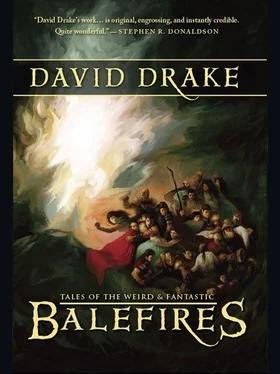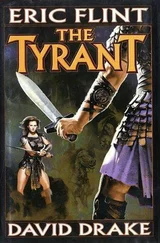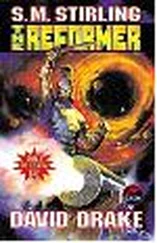David Drake - Balefires
Здесь есть возможность читать онлайн «David Drake - Balefires» весь текст электронной книги совершенно бесплатно (целиком полную версию без сокращений). В некоторых случаях можно слушать аудио, скачать через торрент в формате fb2 и присутствует краткое содержание. Жанр: Фантастика и фэнтези, на английском языке. Описание произведения, (предисловие) а так же отзывы посетителей доступны на портале библиотеки ЛибКат.
- Название:Balefires
- Автор:
- Жанр:
- Год:неизвестен
- ISBN:нет данных
- Рейтинг книги:5 / 5. Голосов: 1
-
Избранное:Добавить в избранное
- Отзывы:
-
Ваша оценка:
- 100
- 1
- 2
- 3
- 4
- 5
Balefires: краткое содержание, описание и аннотация
Предлагаем к чтению аннотацию, описание, краткое содержание или предисловие (зависит от того, что написал сам автор книги «Balefires»). Если вы не нашли необходимую информацию о книге — напишите в комментариях, мы постараемся отыскать её.
Balefires — читать онлайн бесплатно полную книгу (весь текст) целиком
Ниже представлен текст книги, разбитый по страницам. Система сохранения места последней прочитанной страницы, позволяет с удобством читать онлайн бесплатно книгу «Balefires», без необходимости каждый раз заново искать на чём Вы остановились. Поставьте закладку, и сможете в любой момент перейти на страницу, на которой закончили чтение.
Интервал:
Закладка:
He was splendid, perfect in her eyes.
There were more riders, scores of men on foot including dog handlers as shaggy and grim as the beasts they dragged off the mangled stag. A huntsman's broad knife flashed and he raised the deer's ears and tail to the laughing youth. An unexpected warmth had driven the fear from Lena's mind. She watched, empty even of wonder at the scene beneath her-more men by ten times than she had ever before seen-while her eyes drank in every motion, every nuance of the young rider in red and gold.
Quick knives unlaced the deer, spilling the entrails to the reward of the hounds. The mastiffs sat aloof on their haunches, nearly the height of the footmen who skirted them with nervous eyes. Those killers were fed once daily and scorned to show interest in the game they brought down. Only their tongues… they flashed and rolled, infinitely flexible as they wiped clean the bloody jowls.
The babble thinned as did the crowd below. The hounds were tired and sated. They whined when the handlers chained them in pairs, but they allowed the men to lead them back the way they had come. Two brawny retainers slung the gutted deer on a pole and trotted off behind the youth on horseback. Riders drifted after them, talking and laughing as they passed out of earshot. Nothing remained but a ragged circle trampled black on the leaf mould. The horn was playing a caracol that seemed to hang in the air even after it was actually inaudible.
"The Ritter Karl," Lena was whispering to herself. She slurred into the heavy Swabish of her parents the name purred by the retainers. "Karl von Arnheim…"
Kort, already reslinging the load of food, paid her no attention. But Lena continued to roll the syllables under her tongue.
Months passed. Occasionally there were true men in the Forest: a pair of nervous travelers with packs and staves, whistling into the shadows; a vagabond whose rags were streaked with pus from the ulcers they covered; once a dozen men together, armed and as lean as the wolves… these wore mismated finery and as many as a dozen rings on each hand.
The von Arnheim hunt did not pass close enough for Lena to hear and run to it.
The woods folk travelled, but they did not roam. Lena's wanderings, at first for hours and then for days, were a cause of great concern to the family. Kuemeh pleaded with her, but the soft, cooing language of the folk had no words for the emotions that were driving the girl. The pleading stopped in time, for none of the family could catch Lena now if she ran. A foraging people learn not to waste effort. Some useful knowledge came from the trips: food sources that the family could exploit now or in the future, caves that opened into spacious chambers from throats too narrow for a bear to enter. But more and more, Lena's travels were to the edge of the fields of men; and this she did not explain to the woods folk, knowing instinctively that if she had, nothing would have kept Kue-meh from ordering an immediate move scores of miles deeper into the Forest.
And already the trips were considerable endeavors. Settlements had shrunk back from the trees, save for scattered households as Teller's had been. There were more of those than Lena would have guessed in the days when the Forest was a prison wall, but rarely did the inhabitants attempt to farm the thin soil as had her parents. Most were charcoal burners, blackened men or couples too bent to display sexual distinctions, hiking ever further to find the hardwoods that stoked their greedy kilns. Their huts were ragged shambles, sometimes lean-tos sprawled against some Forest giant; but the kilns were anchors, too slow and demanding of construction to be abandoned for new sites nearer the fuel. The increasing journeys to find an oak in the evergreen forest, then to fell it and laboriously drag back lengths with a shoulder harness, left no time for the necessary leisure of building another kiln.
Spread by the Plague, the lonely farmers were men who had tried to escape Death by running and had delayed his approach by a score of miserable years. The charcoal burners were caught between the upper and nether millstones of shrunken markets and scarcer raw materials, the farmers between declining fertility and impoverishment of tools. The third group, the meat hunters, had shrunk also though they might have been expected to increase. Game had returned to the fringe lands when men had melted away in the black ooze of the Plague, but the Forest had grown darker. Even those who had made their living in it for decades began to edge out into the sunlight.
The demons that haunted the minds of humans in the Forest were not the woods folk. In all her ramblings, Lena found no sign of hairy men other than Kort and his family.
She searched farther, into the lands where farms still sprawled in the open and men plowed behind animals, instead of prodding the soil with a stick. In the dusk she eeled along hedgerows so silently that the hens nesting in them did not stir. Where there were dogs, they rose and stalked stiff-legged over to Lena. After they sniffed at her, they whined and walked away. Occasionally a persistent brute would nuzzle the girl until her fingers stroked a rumbling purr from its rib cage. None of the beasts barked or attacked her.
The domestic animals were new to her, but she paid them little attention. Lena had come to the lands of men to find a man.
The farmers' huts were windowless, occasionally stone or proper wood but more often wattle and daub. The girl's eyes found chinks when the buildings were lighted, raked the faces of sleepy residents when they stumbled out to relieve themselves on the ground. But the man she sought would not be found in a hovel. It was long months before she came to understand that, however, since her upbringing had been silent about the Herren, the Masters.
As the seasons passed, as a month of searching became twelve, Lena's life was still almost wholly within the Forest. The trips beyond were windows of excitement that sparkled to set off well-loved panels of wood. The tall child had become a tall girl, muscled like a deer but with the same lithe slimness she had borne from the first. The woods folk did most things with grace, but they could not run. Faal watched Lena's sudden fits of exuberance, her flashing spurts across a clearing or through a briar thicket without misstep. His eyes glowed with the wonder and delight of a prophet to whom an angel was descending.
At night his copper nails glinted as they plaited her hair in wondrous fashion.
In a human world with little romance, the golden wraith became a legend before she was truly a rumor. Cottagers nodded and swilled thin beer as one of their number embellished an instant's vision. Sometimes Lena became a messenger from God or a Hell-sprite, searching for an infant's soul to steal. More often the stories were rooted deeper in the soul-earth of the peasants than Christ would ever be, and lowered voices spoke of Forest shadows and spirits of the Earth.
Marvel in most listeners became professional curiosity in gray Rausch the huntsman. His belt knife, honed to a wire edge on a stream-tumbled egg of granite, had silver mountings and the rampant wyvern crest of the von Arnheims. The late Ritter, Karl's father Otto, had presented it to Rausch twenty-one years before to replace the knife his junior huntsman had broken on a boar's scapula. Barehanded, ignoring the blood-slick tusks, Rausch had wrestled the beast to the dirt at the feet of the Ritter's pregnant wife. From that day he rode at Otto's right stirrup and that of Karl after him. He would not have exchanged that blade for the Emperor's sceptre.
Save for when von Arnheim hunted, Rausch's time was his own. If he chose to examine a hedgerow on his knees, snuffling like a gray-jowled hound, who was there to gainsay him? So Rausch listened and he watched, while as carefully as a cathedral mason his mind was constructing the hunt that would crown him and his master.
Читать дальшеИнтервал:
Закладка:
Похожие книги на «Balefires»
Представляем Вашему вниманию похожие книги на «Balefires» списком для выбора. Мы отобрали схожую по названию и смыслу литературу в надежде предоставить читателям больше вариантов отыскать новые, интересные, ещё непрочитанные произведения.
Обсуждение, отзывы о книге «Balefires» и просто собственные мнения читателей. Оставьте ваши комментарии, напишите, что Вы думаете о произведении, его смысле или главных героях. Укажите что конкретно понравилось, а что нет, и почему Вы так считаете.











